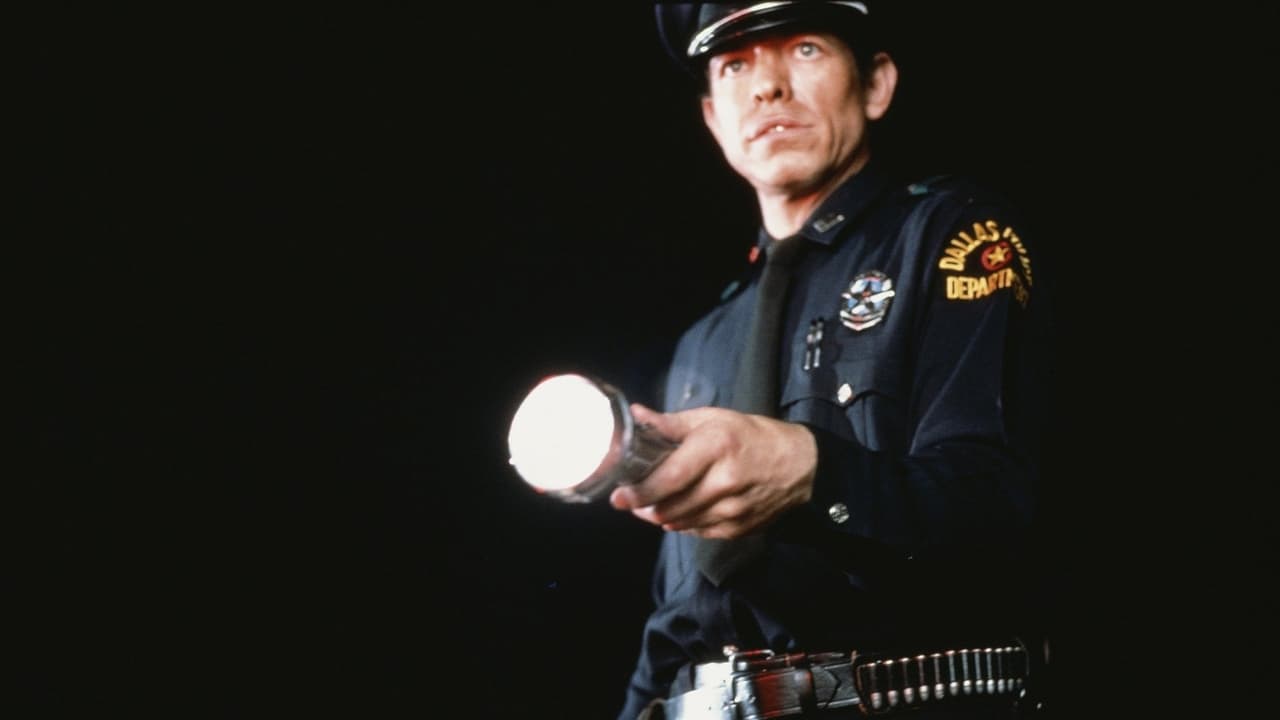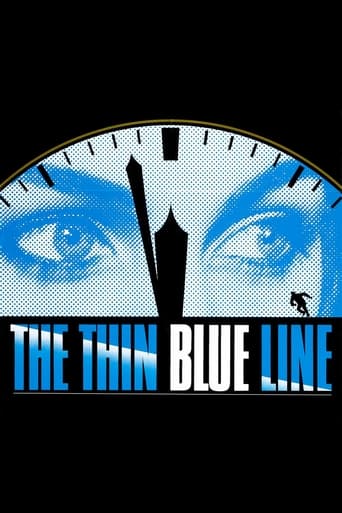rzajac
It's nice to know how legal/justice systems can run so badly off the rails.Had this thought: It is now May of 2017, and the U.S. has a "president" who often, on the stump, expressed the supreme value of "winning".This flick shows *exactly* why "winning" can never function as a standalone value. The prosecutor who went after Adams valued winning over all else... certainly over simple justice.I would say that is the moral of the story of The Thin Blue Line. Others will tell you it's about injustice or Due Process short-cutting or an illustration of how the Wild West ain't dead in Dallas. Those things are also true, but you have to understand where those things came from: They came (and likely still come) from an ethos of winning as a supreme value/virtue.I like shaggy dog stories which are extended parables on a simple moral idea, and that's what The Thin Blue Line is. This is Morris's bailiwick. He's passionately interested in finding a kind of universal equation of morality, and TTBL is a stepping stone in this quest.It's a certain kind of product, to be sure. It's a documentary: If you don't like documentaries, don't waste your time. But Morris expertly puts the material together, interlacing it with graphics, establishing shots, and reenactments to make the piece hum with subjective moral urgency. If that sounds like it might redeem the genre, then give it a go. Just be sure you're poised to pay very close attention.This was Morris's first proper, full- length treatment, and my introduction to his work. Took my mom and some buddies to watch it at The Inwood, probably a half a kilometer from where Officer Wood was shot.
sharky_55
Documentary has never and can never be an objectively reproduction of reality, yet it is an expectation of the genre nonetheless. There have been many attempts in the past to achieve this goal: pure cinema, shooting in the verite style, observational modes, or even exhibitions such as Andy Warhol's Empire, an eight hour unbroken shot of the Empire State Building. But even the decision to begin shooting is an artistic choice in itself, which can reveal anything from the composer's ideology to their worldview and values. The form is fraught with many manipulations - how to edit footage or to even edit at all, how to hold the camera, the length of shooting, what to capture, and so on. Documentary has never been about transferring reality onto film, but rather representing a distinct point of view, a social purpose, a message. With The Thin Blue Line, Errol Morris breathed new life and new controversy into the genre. Harvey Weinstein fiddled with its marketing, attempting to sell it as a murder mystery thriller and inviting the audience to participate in the solving of the case. The Academy was not entirely convinced of its origins. Morris' re-enactments of the night of the crime verge on expressionism; noirish blacks, coiling smoke and fog, red sirens pulsing alongside a Phillip Glass soundtrack that churns ominously and urgently as if in anticipation of the impending bloodshed. His closeups render a popcorn maker into majestic machinery, and draw close scrutiny to what should be an innocuous detail. Did the officer drop the milkshake onto the ground? Or was it safe and sound in the cupholder? Morris continually intercuts between objectivity and subjectivity, throwing up a barrage of inserts of statistics, police reports and newspaper articles which cannot be wrong. Then there is the heightened re-enactment, the literal smoking gun thrust into the frame, forcing us to contend with what Robert Wood saw in the last moments of his life. How can we trust what the talking heads are saying without the little captions that always accompany their first appearance, introducing their title and role? How can we be sure of their honesty and truthfulness if we cannot hear Morris' questions in voice-over? Morris blows up factual details with extreme closeups, and slows down moments like the milkshake hitting the floor or the gun under the seat, as if to scrutinise their actual existence. He flashes anecdotal recounts of the night from his interviewees, then juxtaposes their clarity with trails of thought that fumble around for the truth. Was there one person in the car, or two? Did the driver have sandy-blonde hair, or bushy hair? There can be no objective truth when an event is reconstructed from hazy recollections and memories - Morris is merely mimicking this process. He never claims to represent the absolute truth, but through piecing bits of evidence together, assembles an alternate story that points to an alarming injustice. Morris' interview process would later lead to his development of the Interrotron, first used in Fast Cheap and Out of Control. The device, a similar to a teleprompter, allows the camera to capture the direct gaze of the subject whilst maintaining the intimacy of a one-on-one interview. Randall Dale Adams, in his prison whites, looks directly into our eyes. We meet the cold gaze of the psychopath David Harris, who freely admits to the crime. There is no doubting that they are addressing us, that they believe in the words that come from their mouths, even when they are lying. Would the final scene be half as chilling if Morris' camera had not coincidentally broken on the day, forcing him to record only the dialogue of Harris' fateful confession? Perhaps not, but it is how that version of the events has been presented to us, and we must evaluate what we see (or hear). We assemble our reality from the details we are given, yet sometimes a conclusion is forced from puzzle pieces that do not match. That is how the prosecutors saw it, that they could convict an adult in Adams but not the adolescent perpetrator. In The Thin Blue Line, Morris is chopping up the documentary form. He is rearranging and shifting the pieces to create something resembling the truth, but do we ever hear an outright declaration of the innocence of Adams, or the guilt of Harris? No, because to do so would be as dishonest as the prosecution all those years ago. He merely shows the wrongs and falsities of the testimonies for what they are - that is the power of film.
Red_Identity
Considering the acclaim for this, perhaps I expected something a little more unconventional. The film, is certainly a fabulous mood piece. The director is not afraid to have different recreations based on different peoples' memories, and he certainly revels in trying to come up with the ambiguities in all of the films. The film does start off ambiguous by the start, but somewhere along the way the scales tip in one side and you're then firmly planted on one of the two sides, and all of this is of course intentional, and there is enough speculation to make you confident in your belief but still not actual evidence, which does leave the whole thing open by the end.
SnoopyStyle
In 1976, Dallas police officer Robert W Wood was killed during a traffic stop. His partner was one of the first female police officers in Dallas. The car was stolen and she had problems recalling the event. Randall Dale Adams was eventually convicted for the crime. David Ray Harris had bragged about the killing but later claimed that it was Randall who killed the cop. David had picked up Randall hitchhiking and spend the day together. While Randall claimed to be with his brother, David claimed that he was with Randall who shot the cop.This is a breakthrough Errol Morris documentary. The case itself is interesting and the fact that it actually helped overturn the case is impressive. There is a hypnotic beauty to the reenactments along with the Philip Glass music. The movie does take a little while to lay down the incident. I think a more straight forward recitation of the main facts of the case with narration at the beginning would be better. This is a ground breaking documentary.

